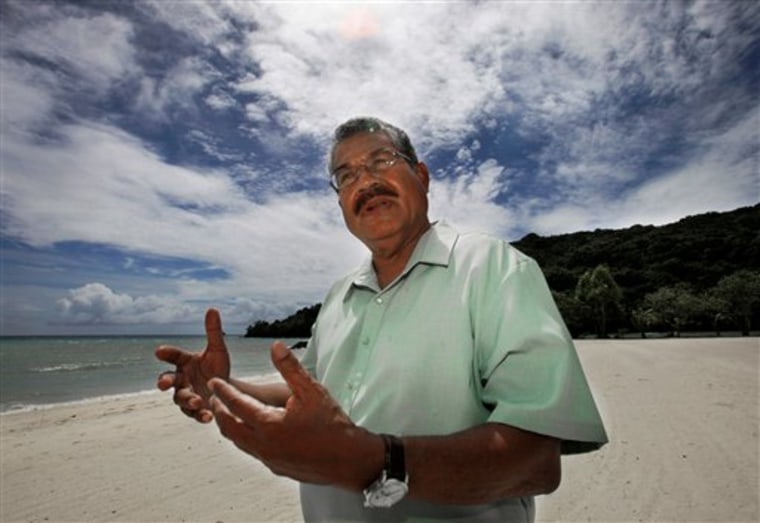The tiny Pacific island nation that agreed to accept 13 Chinese Muslims from Guantanamo prison has offered itself as a safe haven before.
Palau, famed for lush tropical landscapes and spectacular diving, earlier agreed to take in former Khmer Rouge leader Pol Pot and rescued Afghan refugees, its president said Saturday. But neither of those two deals panned out.
"It's our age-old tradition to receive those in need whenever they somehow arrive on our shores," President Johnson Toribiong said in an interview with The Associated Press.
Palau, a former U.S. trust territory about 500 miles east of the Philippines, made headlines last week after agreeing to President Barack Obama's request to take the 13 Chinese Muslims, known as Uighurs, after other countries turned Washington down.
Toribiong, however, said their transfer is not a done deal and described the likelihood of their arrival as "50-50." And even if they do arrive, it won't be for another two or three months, he said.
"It's still tentative, it's not definite yet," he said.
"The two previous times, we agreed, but they didn't come."
The plan to temporarily move Pol Pot, the Cambodian dictator accused of genocide, to Palau before he faced an international tribunal never materialized because he died mysteriously in bed in April 1998, Toribiong said.
Several hundred Afghan refugees that Palau agreed to accept after they were rescued from a sinking boat near Australia in 2001 were sent instead to Nauru, another small South Pacific island.
Toribiong, interviewed by the AP at a beachfront resort, said he had never heard of the Uighurs until the U.S. approached him earlier this month. He has sent four Palauan officials to Guantanamo Bay in Cuba to learn more about them.
'We struggle everyday'
Palau is one of the world's smallest countries, with about 20,000 people scattered over 190 square miles. Only nine of its 340 islands are inhabited. Most residents work in tourism, construction, fishing and farming, leading modest lives in stark contrast to the extravagant resorts enjoyed by its foreign visitors.
Toribiong cautioned against the perception that the detainees were being released into a tropical paradise.
"We struggle everyday," he said. "They're coming to a developing country with many, many islands and a diverse population. We need people to help Palau develop."
The Uighurs, a Turkic people from China's far western region of Xinjiang, were captured in Afghanistan and Pakistan in 2001. The Pentagon determined last year that they were not "enemy combatants."
Sending them back to China was not an option because of concerns that Chinese authorities, who consider them violent separatists, would immediately arrest the men.
Four other Uighurs left Guantanamo Bay on Thursday for a new home in Bermuda, setting off a political firestorm there. Britain reprimanded officials in its Atlantic island colony over the deal with the U.S., and dozens of residents criticized the government for its decision to accept the former prisoners.
Shipped off to Albania
Three years ago, the U.S. freed five Uighurs who were detained at Guantanamo and resettled them in Albania. Less than two weeks after they arrived, lawyers for two of them filed a motion demanding they be moved to a more suitable place.
They said the local media had branded the men "terrorists" and they couldn't find jobs in one of Europe's poorest countries.
China has demanded that all the Uighurs be sent home. It has filed a formal objection to Palau's mission to the United Nations, Toribiong said. Palau, however, has no diplomatic relations with China and recognizes rival Taiwan instead.
The Palau team, which includes a doctor and education specialist, will interview the detainees and tell Toribiong how his government should prepare for their possible arrival.
"Then we wait for the U.S. to tell us whether they agree to bring them here or change their minds," Toribiong said.
Resettlement agreement
Palauan authorities have yet to determine where the Uighurs would live, or what they would do. The government will build houses for them if needed and offer orientation to the nation's language and culture.
They will likely be confined to Palau since they do not have passports.
"If they come to Palau and become constructive, positive, friendly residents, it will be OK," Toribiong said. "We have 445 Muslims living with us right now. We have no problems."
About 30 percent of Palau's inhabitants are foreigners, mainly Filipinos and Bangladeshis. The majority of the nation is Christian.
The U.S. will pay for the Uighurs' move to Palau, but Toribiong denied that his country would be receiving $200 million in aid as part of the deal.
Palau does, however, want to remind Washington that it is a dedicated ally ahead of talks to renew a key agreement outlining their relationship. The Compact of Free Association expires Sept. 30.
"It will prove to the United States that not only are we a close friend, ally and partner, we are their friends whether it's sunny or cloudy," Toribiong said.
U.S. aid to Palau is expected to exceed $852 million during the 1995-2009 period, according to the U.S. General Accounting Office.
Toribiong added that the U.S. has offered to upgrade its representative in Palau — currently a charge d'affaires — to full ambassador.
In a letter to Toribiong last week about resettling the detainees, Secretary of State Hillary Rodham Clinton said a "successful resettlement arrangement would deepen the already strong and special relationship between the United States and Palau and help us move toward the closure of the Guantanamo Detention Facility, a problem of global concern." A copy of the letter was obtained by The Associated Press.
Some residents have responded to news of the Uighurs with displeasure, saying they had not been consulted about the move.
The president said he convened an emergency meeting to discuss the issue with top lawmakers and the country's two main traditional chiefs, who reminded him of Palau's custom of receiving those in need.
He described those opposed to the idea as "misinformed" or motivated by a political agenda.
